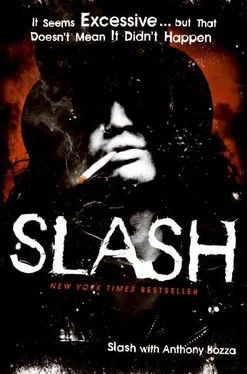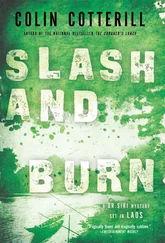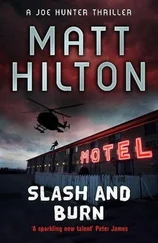I can only imagine how ecstatic Tom was that Guns N’ Roses now had a real manager and a producer that we wanted to work with. It took a couple of years, but it finally looked like this group of lunatics that he’d convinced the label to believe in was actually going to turn out the way he’d promised we would.
Alan set us up in Rumbo Studio in Canoga Park, where Clink liked to work, to do our basic live tracks. Canoga Park was close to where Steven grew up in the Valley, which was a foreign country as far as I was concerned. I think that might have been the point—they thought keeping us out of Hollywood would force us to focus on recording. Alan rented us an apartment at the Oakwoods, which are these generic fully furnished complexes all over the world. He also rented us a van for transportation. For some reason, I can’t imagine why, I became the designated driver.
Mike hired some real professionals to help out his street rats: Porky, a famous guitar tech, and Jame-O, the drum tech. They’d done hundreds of records, total pros who were also fun-loving partiers. They were invaluable to us.
Recording a real album in a proper studio was new to us: we’d done demos in various locations around L.A. Some of them were epic: we did the earliest versions of “Don’t Cry” and “Welcome to the Jungle” at Hollywood Sound, in the same studio where Led Zeppelin recorded their second album. Some of our sessions were epic in a different way, such as the time we got into an altercation over payment with the owner of some shitty studio in Hollywood. He was so coked out that he pulled a gun on us.
“You’re gonna fucking pay me,” he said, his eyes opened far too wide. “Right now!”
“Oh, you’re right,” we said. “Yes, we’re wrong… you’re right; we’re just going to go.”
Someone grabbed our tapes on the way out and thankfully no one got shot.
The first day of recording, we commenced with “Out Ta Get Me,” doing the same thing we’d always done, but in an entirely new setting: we set up in a big live room and just jammed. When I heard the playback, I realized that I had a huge issue on my hands: my guitar sounded like shit coming through a real studio’s soundboard.
During my period of recklessness, I’d managed to hock nearly all of my equipment, including Steve Hunter’s Les Paul. I’d convinced Marshall to send me some amps when we had our rehearsal space out in Burbank but I’d never paid for them, so they took them back. Basically I had nothing: at the time I had three guitars. Two were Jacksons, one of which had been made especially for me: it was a black Firebird with my Shirley tattoo on the body (it sounded like shit). The other was a Strat-like prototype with an arch top that they had loaned to me, and I never gave back. It was one of only two that were ever made. My third was a red BC Rich Warlock. And none of them sounded good through the studio monitors.
I was so frustrated and nervous. We’d come this far, and I was determined to have my guitar sound perfect on the record. But I didn’t know how I was going to make that happen, because I was more or less bankrupt. I tried to downplay how I felt during those basic tracking sessions by drinking a lot and jumping around while I played with the band, knowing that somehow I had to figure this out and rerecord all of my parts. The other guys weren’t going to need to do that—Izzy, Duff, and Steve were so tight right off the bat that those tracks needed no improvement at all.
Recording was going great, but life in the Valley was not. After we wrapped each night, Tom Zutaut, Axl, Duff, and Mike would go home. Theoretically, Izzy, Steve, and I were supposed to go to the Oakwoods and do the same. Usually we were much too excited, so we’d try to go out and we quickly became problematic residents of Canoga Park. We figured that there must be nightlife somewhere, so we sought out anything at all that appeared to be a rock club, a pub, or a bar. We’d roll into what always turned out to be a very conservative neighborhood disco, if that even makes sense, or some bar ruled by a suburban country-music situation. A scraggly mini-gang of long-haired guys in either of those scenarios was an instant clash.
At the time Alan had hired a guy named Lewis, who was posing as our security guard, to look after us. Lewis weighed somewhere between three hundred and four hundred pounds and drove a late-seventies sedan with the driver’s seat pushed completely into the backseat just to accommodate his girth. He was a really sweet guy from Houston and I loved him, but when he was supposed to be on security detail, he was usually eating. Lewis had this way, and I don’t know how he did it, of going around to the back door of any place we might go to and procuring a huge carton of food from the kitchen. They would literally give him a cardboard box full to the top of take-out containers with everything on the menu in there. This wasn’t a burrito or a taco kind of handout—Lewis had entire entrées, like four of each of them. It was something the likes of which I’ve never seen. He’d take this haul out to our car and just eat.
Meanwhile, inside, usually the three of us got into or just barely avoided full-on bar fights. We were psycho enough to scare people off most of the time, but sometimes it got ugly. Luckily, we weren’t ever hauled out to the parking lot by a mob of redneck shitkickers—if we had, we might have interrupted Lewis’s meal.
Valley nightlife got so tedious that one night when we came home after a great day in the studio and a few hours of heavy drinking, we did the only thing that made sense: we destroyed our Oakwoods apartment Keith Moon style. We tore down everything that wasn’t nailed to the wall, and smashed everything else beyond recognition. We turned the beds over, we smashed the nightstands, and we pulled the kitchen counter out of the wall. We smashed the huge sliding-glass doors, we broke the windows and every mirror, glass, and plate in the place; we destroyed the TV, and the armoire the TV was in. There were splinters and glass everywhere. I woke up on the couch, which was broken, too, with an insane hangover and surveyed the room through squinted eyes.
“Uh-oh,” I mumbled… to myself.
Once my accomplices and I were awake enough, we agreed to lie: we decided that someone had broken in when we weren’t there. We came back late that night and passed out, opting to deal with it in the morning. We told Alan that exact story that day at the studio, because by then he’d become the band’s mother figure, a lot like Malcolm McLaren was for the Sex Pistols.
We had every intention of sticking to our bullshit version of events, but as Alan began to ask questions, our story got more and more confused and transparent. Before he called us out, we admitted everything. The funny thing is, after considering his options, Alan decided to go back to the Oakwoods and feed them the same story we’d invented. They didn’t buy it either—I can’t imagine why—so it went on our tab. For a while there we were banned from all Oakwoods properties worldwide. Apparently the ban was lifted somewhere along the line, because I lived in another of their locations briefly five years later. I managed to be a problem once more, this time by mistake: my snake—I can’t remember which one I had with me—got adventurous and crawled down the toilet. It resurfaced in a neighboring room and scared the shit out of someone. Sorry about that…
WE WRAPPED UP THE BASIC LIVE recording in just a few weeks and everything sounded great—except my guitar. Alan had booked me time at a studio called Take 1 to rerecord my parts, but I still hadn’t found a proper guitar. I didn’t know what I was going to do; I tried to play it cool and not show signs of stress, but as our time drew to a close, there was no solution in sight. On our very last day at Rumbo, Alan came into the control room and laid a guitar case on the small couch behind the soundboard. The little cubby where the couch fit was lit by one overhead light, which perfectly spotlighted the guitar as Alan opened the case.
Читать дальше
Конец ознакомительного отрывка
Купить книгу




![Сол Слэш Хадсон - Slash. Демоны рок-н-ролла в моей голове [litres]](/books/387912/sol-slesh-hadson-slash-demony-rok-n-thumb.webp)


